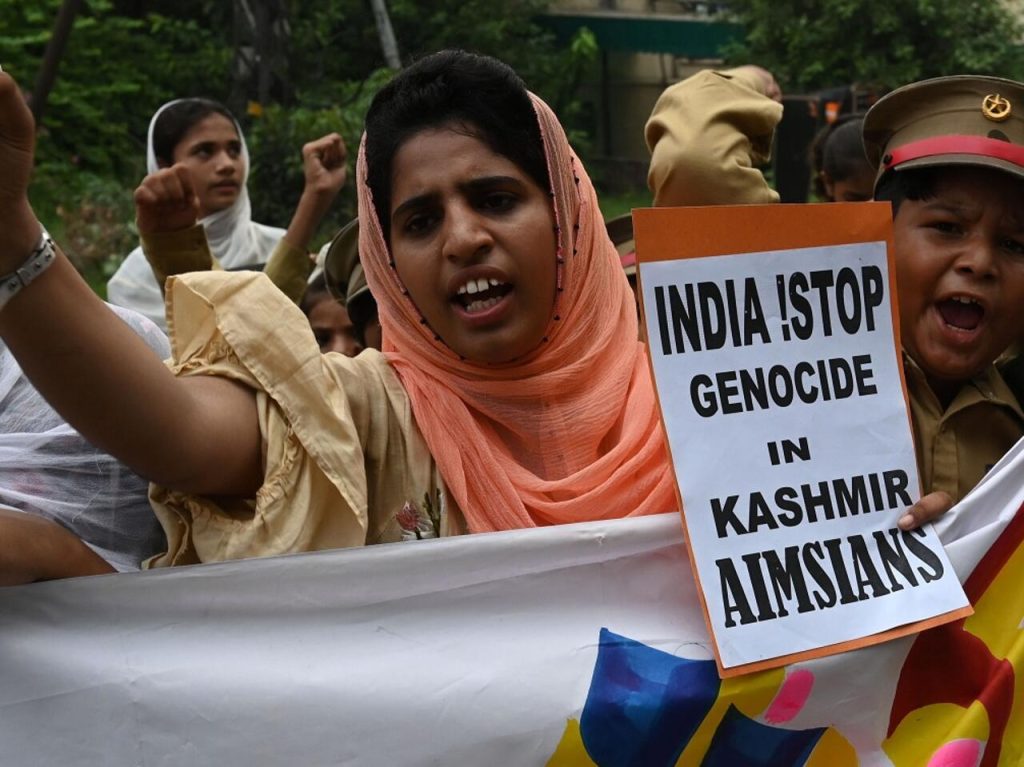The region of Indian Illegally Occupied Jammu and Kashmir (IIOJK) has long been a theater of tragedy, oppression, and human suffering. Since 1947, when India forcibly annexed the territory, the plight of the Kashmiri people has been marked by relentless violations of international laws and human rights conventions. India’s actions in IIOJK starkly contravene the United Nations Genocide Convention and numerous United Nations Security Council Resolutions (UNSCR), including UNSCR 38, 47, 51, 91, and 122. The international community’s collective silence on the Kashmir tragedy and the ongoing genocide is an indictment of its failure to uphold its legal and moral obligations.
India’s occupation of IIOJK began in 1947 under the guise of securing the princely state. Over decades, India’s actions have systematically undermined the rights of Kashmiris, violating the UN Genocide Convention’s stipulations. The 1948 Convention defines genocide as acts committed with intent to destroy, in whole or in part, a national, ethnic, racial, or religious group. By this definition, India’s actions—including extrajudicial killings, arbitrary arrests, and the destruction of Kashmiri homes and livelihoods—constitute genocide. Article 1 of the 1948 Convention obligates member states to prevent and punish genocide. Yet, despite clear evidence, the international community has failed to act decisively.
The revocation of IIOJK’s special status on August 5, 2019, marked a grim escalation in India’s genocidal campaign. By repealing Article 370 of the Indian Constitution, the Hindu nationalist government of Narendra Modi removed the region’s autonomy, paving the way for a systematic campaign of ethnic cleansing and demographic apartheid. Since then, Indian forces have intensified their campaign of oppression.
Kashmir has witnessed mass killings, enforced disappearances, sexual violence, and collective punishment. The deployment of over 1.5 million security personnel, including 750,000 soldiers, has transformed the region into a military garrison. Internet shutdowns, curbs on media, and the arrests of human rights defenders have further isolated Kashmiris from the outside world. Amnesty International’s reports detail how Indian authorities use counter-terrorism as a facade to impose collective punishment on the Kashmiri population, including brutal crackdowns on peaceful protests.
The Indian government’s actions exhibit clear warning signs of genocide, as outlined in international law. The systematic dehumanization of Muslims in IIOJK, labeling them as “terrorists,” has fueled anti-Muslim sentiment across the region. This rhetoric, endorsed by the ruling Bharatiya Janata Party (BJP), delegitimizes the Kashmiri struggle for self-determination while justifying violence against them. The BJP’s Hindutva ideology, coupled with statements from senior officials advocating a “Final Solution” for Kashmir, signals a genocidal intent.
One of the most dangerous aspects of India’s genocidal policy is its attempt to alter the region’s demographic composition. By introducing the Jammu & Kashmir Reorganization Order of 2020, the Indian government has facilitated non-Kashmiris’ settlement in IIOJK. This move, aimed at diluting the Muslim majority, violates international law, including the Fourth Geneva Convention. Historical precedents—such as the massacre of 300,000 Muslims in Jammu in 1947 and the forced migration of over 3.5 million Kashmiris to Azad Jammu and Kashmir (AJK)—underscore the genocidal nature of this policy.
The Modi government justifies its actions in IIOJK under the pretext of bringing economic development to the region. However, this claim is a facade. The destruction of over 110,000 homes and structures, coupled with the economic disenfranchisement of Kashmiris, exposes the hollowness of this promise. The BJP’s rhetoric of prosperity is merely a cover for its genocidal agenda.
The scale of atrocities in IIOJK is staggering. According to the Research Section of Kashmir Media Service, between January 1989 and October 2023, over 96,262 Kashmiris were killed, including 7,316 in custodial or fake encounters. More than 168,567 civilians were arbitrarily arrested, and 11,259 women were raped. Reports from Amnesty International highlight that torture, custodial deaths, and sexual violence are routine in the region. The state’s human rights commission has been dissolved, leaving victims no recourse to justice.
The international community has a legal and moral obligation to intervene. The UN’s Responsibility to Protect (R2P) framework emphasizes the collective responsibility to prevent genocide, war crimes, ethnic cleansing, and crimes against humanity. Yet, the world has paid no heed to the suffering in IIOJK.
The genocide in IIOJK is not a tragedy of the past; it is an ongoing atrocity that demands urgent attention. The international community must move beyond mere condemnation to take tangible steps to protect the Kashmiri people. This includes imposing sanctions on India, initiating independent investigations into human rights abuses, and supporting the Kashmiri right to self-determination as enshrined in UN resolutions.
Kashmir’s future depends on the world’s willingness to act decisively. The time for silence has long passed. The global community must rise to its responsibilities under international law to end the suffering in IIOJK and ensure that the voices of the oppressed are heard and their rights restored. Anything less would be a failure of humanity.


